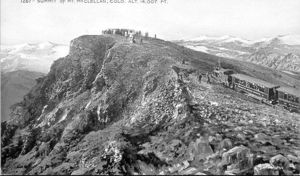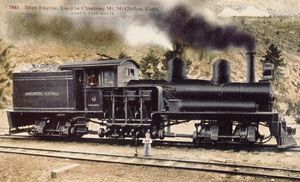Argentine Central Railway
| Argentine Central Railway | |
|---|---|
| Locale | Colorado |
| Dates of operation | 1906 – 1918 |
| Track gauge | 3 ft (914 mm) |
| Headquarters | Waldorf, Colorado |
The Argentine Central Railway was a narrow gauge railroad in the United States built from the Colorado and Southern Railroad at Silver Plume, Colorado to Waldorf, Colorado (now a ghost town) and onward to the summit of Mount McClellan. Construction began on August 1, 1905 and was opened a year later on August 1, 1906. It was financed and organised by Edward J. Wilcox, owner of 65 mining properties in the Argentine region that were consolidated into the Waldorf Mining and Milling Company in 1902. His headquarters at Waldorf was only accessible by pack mule for much of the year.
As well as serving the silver mining operations of the region, the railroad was also intended for the tourist trade, ascending 13,117 ft Mount McClellan and intending to reach the summit of 14,270 ft (4,350 m) Grays Peak nearby. It was believed at the time that Mount McClellan was 14,007 ft high, but this was later disproved. It remains the highest altitude reached by a regular adhesion railway (as opposed to a rack railway) in the United States.
The line was steeply graded and sharply curved, with a standard of 6% grade maximum and 32° minimum curvature; even so, it required six switchbacks on the ascent. Due to these grades, geared steam locomotives were used exclusively, the railroad rostering a total of seven two-truck Shay locomotives.
As well as ascending Grays Peak, Wilcox also intended to bore a tunnel to reach Keystone, Colorado and the Denver, South Park and Pacific Railroad. The tunnel was reported three-quarters complete in 1914, but economic conditions never permitted completion.
The fall of silver prices after the Panic of 1907 ruined Wilcox, causing him to sell the railroad in 1908 for only $44,000, taking an estimated loss of $256,000 on the line. The buyer, David W. Brown of Colorado, planned an expansion in the tourist traffic and revitalised the concept of reaching Grays Peak, but the money was never there. The line went bankrupt and a receiver was appointed on August 3, 1911; it did not operate during 1911 and 1912.
A consortium of local business interests led by William Rogers bought the railroad for $20,000 on August 19, 1912 and reorganized it as the Argentine & Gray's Peak Railway. While the new owners were mostly interested in freight traffic, the tourist business brought in sufficient money that it was resumed for the 1913 summer season. Roders transferred the controlling interest in the line for the next season to his associate, egg producer Fred W. Blankenbuhler.
Blankenbuhler replaced the Shay locomotives with gasoline-powered railcars for the 1916 season, but even this cost-saving measure did not make the railroad profitable without the freight traffic it had previously carried. Notice to abandon was posted on October 24, 1918 and approved on November 9; the tracks were removed by 1920.
References
- Hilton, George W. (1990). American Narrow Gauge Railroads. Stanford, California: Stanford University Press, 338–339. ISBN 0-8047-2369-9.


